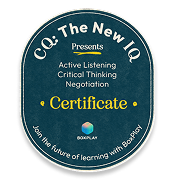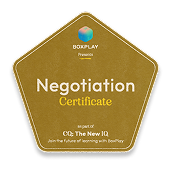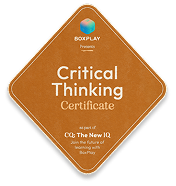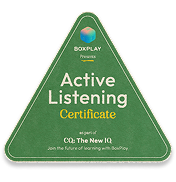Writers
Anna Zucchi
Artists
James Naimi-Akbar
CQ Creator
Clare Munn
In my family, the word ‘fine’ has at least ten different meanings.
Though often a time of joy and harmony, the holiday season also tends to bring family tensions to the surface... A recent survey by Trust & Will revealed that nearly 40% of families report open disagreements during holiday gatherings, with one-third of these conflicts escalating into lasting family rifts (Trust & Will).
Such familial tensions often mirror the pressures we face at work: differing opinions, high emotions, and the struggle to feel heard. Mastering High CQ (Communication Quotient) is essential in these moments - around the conference and dinner table. High CQ is about connecting through empathy, clarity, and purpose. Especially when the stakes are high.
Why we slip into Low CQ Competitive Listening™
When tensions rise, it's easy to slip into Competitive Listening. This is where we stop listening to understand and instead listen to respond. This reflex is rooted in several factors:
- Lack of preparation: When we're pulled off-guard into a debate, this often leads us to rely on preconceptions to feel grounded. Research on disaster readiness shows that lack of preparation increases stress and reactive behaviors, making meaningful dialogue harder.
- Cognitive overload: High-stakes conversations drain mental energy, meaning we lose the capacity for deep, active listening and the ability to process new information effectively.
- Need for validation: Psychologist Dr. Roy Sugarman explains that humans are hardwired to seek recognition, especially when under pressure. While asserting our opinions offers brief satisfaction, it can hinder genuine connection.
If we educate ourselves on the tools to manage these reflexes, we can shift from reactive to reflective responses and ultimately create space for collaborative, constructive conversations.

Scenario: holiday table tension
Imagine this: you’re heading to a family holiday meal, anticipating both joy and apprehension. Last year, a discussion about family traditions spiraled out of control. The thought of a repeat performance weighs on you, but this time, you’re determined to handle things differently.
This year - armed and prepared with High CQ principles - you decide to steer clear of contentious topics and focus on fostering a more harmonious atmosphere. If an uncomfortable topic arises, you’ve prepared responses that reflect curiosity, not combativeness. This approach transforms the interaction into a graceful dance rather than a chaotic clash.
1. Set the tone with intention
Before the gathering, take a moment to reflect: Does engaging in a particular conversation serve a constructive purpose? If the answer is no, there’s no harm in staying silent or steering the conversation to lighter topics. This isn’t avoidance, it’s intention.
If you decide to engage, focus on understanding rather than persuading. For example, if someone brings up a potentially contentious topic, you might say, “I’m curious - what led you to that perspective?” This shifts the tone from defensive to collaborative, helping keep the conversation thoughtful and balanced.
2. Navigate the conversation with non-combative curiosity
It’s tempting to engage in a topic when emotions run high, especially when we feel passionately about it. But if the goal is to keep the peace and maintain meaningful conversations, it's key to express curiosity without trying to win. Research shows that curiosity helps reduce defensiveness and increases openness in discussions, fostering more productive outcomes (Kashdan et al., 2018).
If a family member brings up a touchy subject, rather than reacting emotionally, ask neutral, open-ended questions like, “That’s interesting - can you tell me more about why you see it that way?” This shifts the focus from confrontation to exploration, opening doors for dialogue while diffusing tension. Curiosity opens doors, while defensiveness closes them.

3. Be prepared to deflect when necessary
Not every topic demands engagement, especially when emotions run high. Strategic avoidance is a proven method for preserving relationships and managing conflict (Gross & Thompson, 2007).
If a discussion begins to escalate, use a light-hearted comment or gentle redirection: “Let’s save the heavy topics for another day. How about we focus on this amazing dessert instead?” Knowing when to step back is an act of self-regulation, allowing you to maintain harmony without compromising your peace.
4. Reflect after the conversation
Reflection is key to growth. Studies on metacognition suggest that evaluating our interactions helps us refine our approach and improve future conversations (Schraw et al., 2006).
After the gathering, ask yourself: Did I manage to stay calm? Did I listen without trying to control the conversation? Acknowledging small wins, like diffusing tension or maintaining curiosity, reinforces your High CQ skills.
Finally remember - you can’t control others’ behavior, only your own. Focus on your progress, and if appropriate, share CQ principles with close family members in a gentle, private moment.

Takeaway: Choose connection, not conflict
At the end of the day, holiday meals don’t have to be about who’s right and who’s wrong.
By navigating conversations with curiosity and understanding, we can prevent the energy from devolving into chaotic shouting. The result? A more peaceful, connected, and ultimately meaningful family gathering.
So this year, let’s decide: will we put up walls, or will we build bridges?
References:
Kashdan, T. B., Sherman, R. A., Yarbro, J., & Funder, D. C. (2018). Curiosity and openness as predictors of interpersonal closeness. Personality and Social Psychology Bulletin, 44(9), 1233-1248.
Gross, J. J., & Thompson, R. A. (2007). Emotion regulation: Conceptual foundations. In J. J. Gross (Ed.), Handbook of Emotion Regulation (pp. 3-24). Guilford Press.
Schraw, G., Crippen, K. J., & Hartley, K. (2006). Promoting self-regulation in science education: Metacognition as part of a broader perspective on learning. Research in Science Education, 36(1-2), 111-139.
Heading 1
Heading 2
Heading 3
Heading 4
Heading 5
Heading 6
Lorem ipsum dolor sit amet, consectetur adipiscing elit, sed do eiusmod tempor incididunt ut labore et dolore magna aliqua. Ut enim ad minim veniam, quis nostrud exercitation ullamco laboris nisi ut aliquip ex ea commodo consequat. Duis aute irure dolor in reprehenderit in voluptate velit esse cillum dolore eu fugiat nulla pariatur.
Lorem ipsum dolor sit amet, consectetur adipiscing elit. Proin mi augue, iaculis non finibus non, mollis sed urna. Nam luctus diam ut ante tincidunt, vel vehicula mauris tristique.
Block quote
Ordered list
- Item 1
- Item 2
- Item 3
Unordered list
- Item A
- Item B
- Item C
Bold text
Emphasis
Superscript
Subscript
You do not have access.
You don't have access











